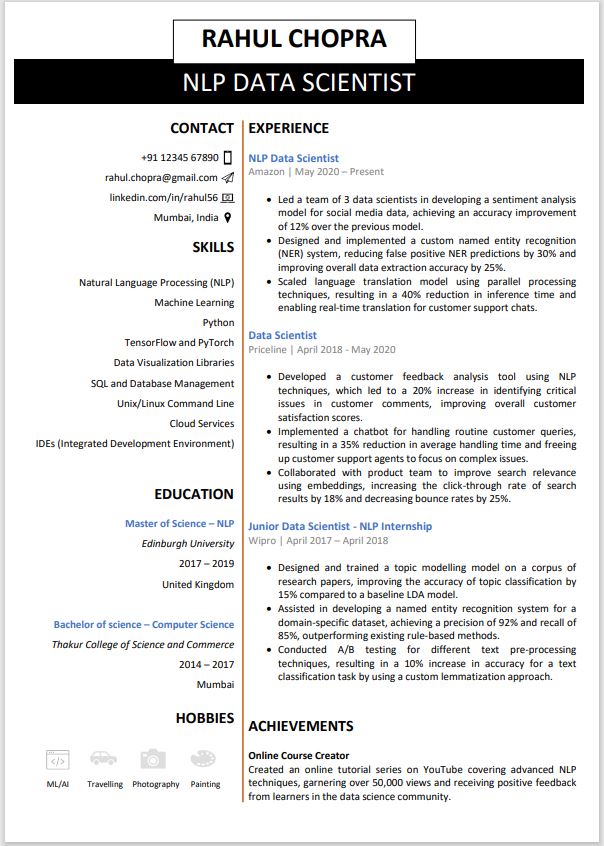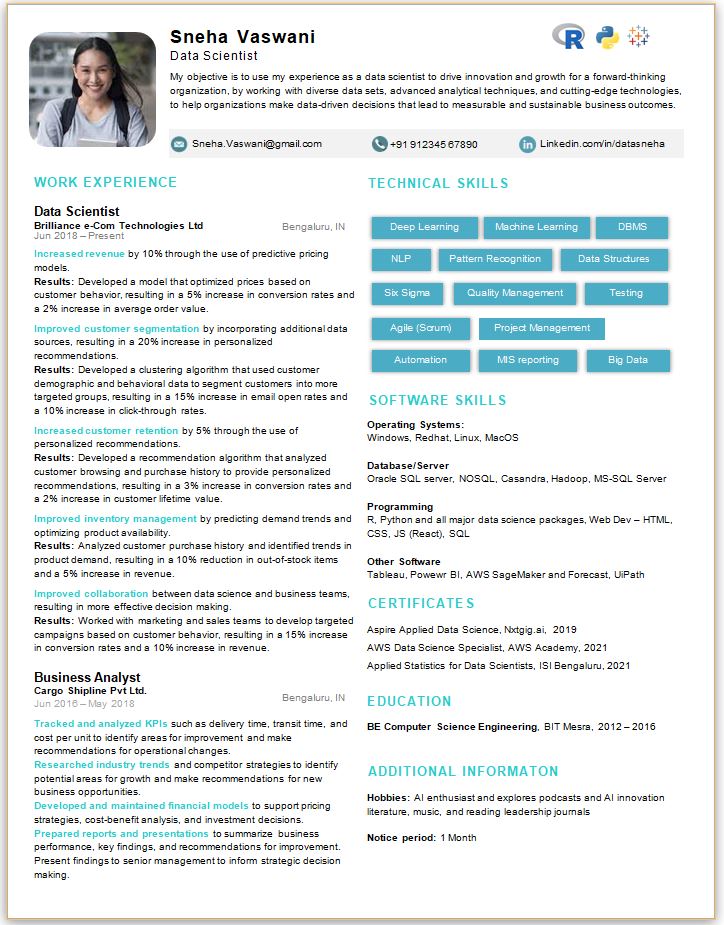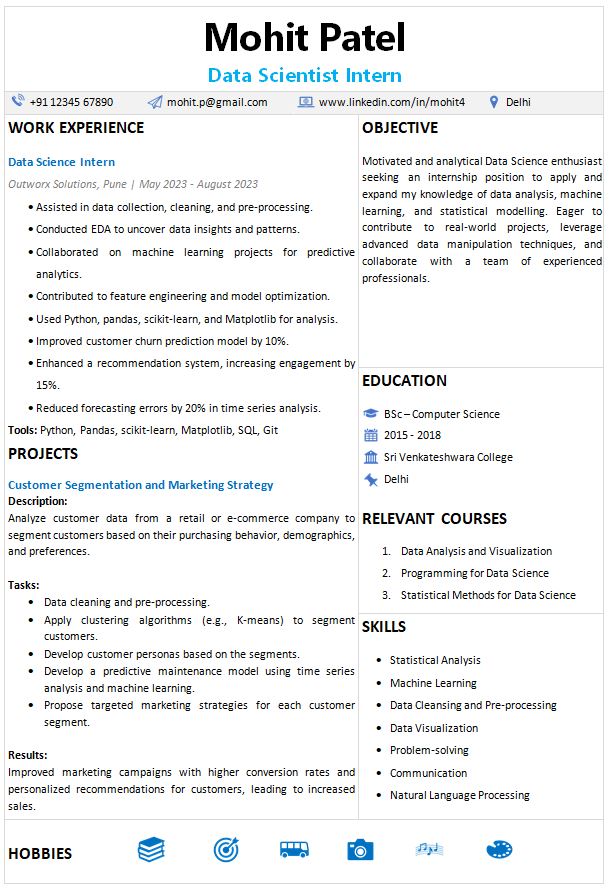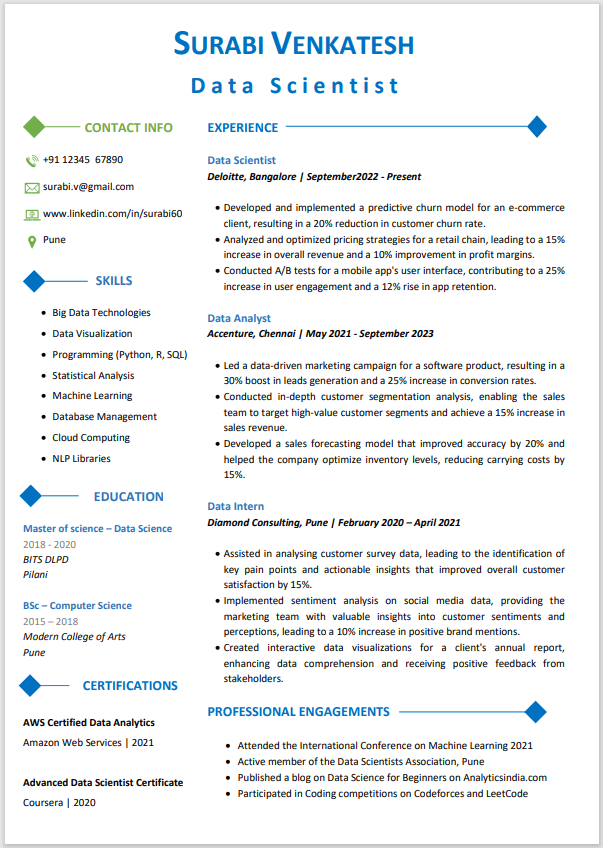Classic Resume
Data Scientist Resume
NLP Data Scientist
DataSciN


Objective
As an NLP Data Scientist, my mission is to leverage the power of natural language understanding and machine learning to extract valuable insights from vast textual data. I am passionate about developing innovative solutions that enhance communication, automate processes, and drive data-informed decisions. With a deep understanding of linguistic patterns and a strong background in machine learning, I aim to contribute to cutting-edge projects, advance NLP technologies, and solve real-world challenges in diverse industries. I am seeking a dynamic and collaborative environment where I can apply my expertise in NLP to make a meaningful impact and continuously push the boundaries of what's possible in the field.
Shorter version of Career Objective Statement
I am an NLP Data Scientist dedicated to harnessing natural language understanding and machine learning for valuable insights from text data. With expertise in linguistic patterns and machine learning, I aspire to innovate and solve real-world challenges, pushing the boundaries of NLP. Seeking a dynamic, collaborative environment to make a meaningful impact.
Education
Master of Science – NLP
Edinburgh University
2017 – 2019
United Kingdom
Bachelor of science – Computer Science
Thakur College of Science and Commerce
2014 – 2017
Mumbai
Skills
Important Skills on Data Scientist Resume
Here are some inputs on why we have listed these skills and some additional considerations if you want to include these on your resume.
1. Natural Language Processing (NLP)
2. Machine Learning
3. Python
4. TensorFlow and PyTorch
5. Data Visualization Libraries
6. SQL and Database Management
7. Unix/Linux Command Line
8. Cloud Services
9. IDEs (Integrated Development Environment)
Why these skills are important on your Data Scientist resume?
1. Natural Language Processing (NLP):
This is a crucial skill for many data science roles, especially if the job involves working with text data. Make sure to highlight any specific NLP projects or experiences.
2. Machine Learning:
Machine learning is at the core of data science, so it's a must-have skill. Consider specifying the algorithms and techniques you are proficient in, such as regression, classification, clustering, etc.
3. Python:
Python is the most commonly used programming language in data science, so it's an excellent skill to have.
4. TensorFlow and PyTorch:
Proficiency in popular deep learning frameworks like TensorFlow and PyTorch is a plus, particularly for roles involving deep learning.
5. Data Visualization Libraries:
Mentioning specific libraries like Matplotlib, Seaborn, or Plotly can show your ability to communicate data effectively.
6. SQL and Database Management:
Vital for handling and querying structured data. Be sure to emphasize any experience with databases like MySQL, PostgreSQL, or NoSQL databases.
7. Unix/Linux Command Line:
Useful for data manipulation, scripting, and working with remote servers or clusters.
8. Cloud Services:
Familiarity with cloud platforms like AWS, Azure, or Google Cloud can be advantageous, especially if the job involves big data or distributed computing.
9. IDEs (Integrated Development Environment):
Mentioning the specific IDEs you are comfortable with (e.g., Jupyter Notebook, PyCharm) can be helpful.
These skills are a strong foundation for a data science resume, but remember that the effectiveness of your resume also depends on how you present and contextualize these skills.
Here are some tips:
Provide concrete examples: Include specific projects or experiences where you applied these skills and achieved results.
Tailor your resume:
Customize your resume for each job application, emphasizing skills and experiences relevant to the specific role.
Soft skills and domain knowledge:
Don't forget to mention soft skills like problem-solving, communication, and teamwork. Domain-specific knowledge can also be an asset.
Certifications and further education:
Mention any relevant certifications or ongoing learning endeavors to demonstrate your commitment to professional growth.
Interests/Hobbies
You should be strategic about what hobbies and interests to list on your resume. Here are some hobbies that are worth considering for your resume.
Hobbies for Data Scientist Resume
Machine Learning and AI Research:
Demonstrates your passion for the field and ongoing self-improvement.
Data Analysis Competitions:
Participation in data science competitions like Kaggle can highlight your skills and competitiveness.
Open Source Contributions:
Involvement in open-source projects related to data science or coding.
Blogging:
Writing about data science topics, tutorials, or projects on a personal blog.
Data Visualization:
Interest in creating and sharing data visualizations, infographics, or data-driven storytelling.
Mathematics and Statistics Enthusiasm:
Demonstrates a strong foundation in the mathematical concepts underlying data science.
Coding Clubs or Groups:
Membership or leadership in coding or data science clubs at your university or in your community.
Teaching or Mentoring:
Sharing your knowledge by teaching data science or programming to others.
Fitness and Health:
Shows a well-rounded lifestyle and discipline, which can be valuable in a demanding profession.
Creative Writing:
Demonstrates strong communication skills, which are essential in data science roles.
Travel and Geography:
Interest in travel data analysis or geographical data projects.
Music and Sound Analysis:
Interest in music data analysis, audio processing, or related projects.
Environmental and Sustainability Initiatives:
Demonstrates a commitment to making a positive impact through data-driven solutions.
Cooking and Recipe Analysis:
Interest in data-driven cooking, recipe optimization, or culinary analytics.
Photography and Image Analysis:
Interest in image processing and computer vision.
Blockchain and Cryptocurrency:
Interest in data analysis related to blockchain technologies.
Volunteering:
Any volunteer work, especially if it involves data analysis or technical skills.
Language Learning:
Demonstrates cognitive flexibility and the ability to learn complex systems.
Board Games or Strategy Games:
Highlights problem-solving and strategic thinking abilities.
Art and Creative Projects:
Any creative pursuits, such as painting, graphic design, or multimedia projects.
Please remember to select hobbies and interests that genuinely reflect your passions and align with the image you want to portray. The goal is to provide a well-rounded view of yourself beyond your technical skills, showing potential employers that you have diverse interests and skills that can contribute to a positive work environment.
Experience
For Data Scientist resumes, do not just list work experiences by focusing on responsibilities or just the names of the projects you worked on; instead, focus on achievements from those projects and quantifying those achievements.
How to list work experience on Data Scientist Resume
NLP Data Scientist
Amazon | May 2020 – Present
• Led a team of 3 data scientists in developing a sentiment analysis model for social media data, achieving an accuracy improvement of 12% over the previous model.
• Designed and implemented a custom named entity recognition (NER) system, reducing false positive NER predictions by 30% and improving overall data extraction accuracy by 25%.
• Scaled language translation model using parallel processing techniques, resulting in a 40% reduction in inference time and enabling real-time translation for customer support chats.
Data Scientist
Priceline | April 2018 - May 2020
• Developed a customer feedback analysis tool using NLP techniques, which led to a 20% increase in identifying critical issues in customer comments, improving overall customer satisfaction scores.
• Implemented a chatbot for handling routine customer queries, resulting in a 35% reduction in average handling time and freeing up customer support agents to focus on complex issues.
• Collaborated with product team to improve search relevance using embeddings, increasing the click-through rate of search results by 18% and decreasing bounce rates by 25%.
Junior Data Scientist - NLP Internship
Wipro | April 2017 – April 2018
• Designed and trained a topic modelling model on a corpus of research papers, improving the accuracy of topic classification by 15% compared to a baseline LDA model.
• Assisted in developing a named entity recognition system for a domain-specific dataset, achieving a precision of 92% and recall of 85%, outperforming existing rule-based methods.
• Conducted A/B testing for different text pre-processing techniques, resulting in a 10% increase in accuracy for a text classification task by using a custom lemmatization approach.
Additional Inputs
Free resources to learn Data Science
Learning Data Science does not have to cost money. We have collated a list of free resources across various platforms to help you learn the skills necessary to become a data scientist.
Online Courses
Coursera: Offers free courses from top universities and institutions. Look for courses like "Introduction to Data Science" or "Machine Learning."
edX: Provides access to courses from universities worldwide, including Harvard and MIT. Check out their "Data Science" program.
Kaggle: Not only a platform for data science competitions but also offers free courses on data analysis and machine learning.
Stanford Online: Stanford University offers free online courses in data science, such as "Statistical Learning" and "Mining Massive Data Sets."
YouTube Channels
Data School: Provides tutorials and guides on various data science topics, including Python, pandas, and machine learning.
Corey Schafer: Covers Python programming and data science topics in a clear and concise manner.
Interactive Learning
DataCamp: Offers free introductory courses in data science, Python, and R. They also have a free Python track.
Codecademy: Provides interactive data science courses, including Python, SQL, and machine learning.
Books
"Python for Data Analysis" by Wes McKinney: A widely recommended book for learning data analysis with Python.
"Introduction to Statistical Learning" by James, Witten, Hastie, and Tibshirani: A free book that covers the fundamentals of statistical learning.
Blogs and Websites
"Towards Data Science": A Medium publication featuring articles on various data science topics.
"Data Science Central": Offers a wealth of articles, webinars, and resources for aspiring data scientists.
Online Communities
Stack Overflow: A platform where you can ask and answer data science-related questions and find valuable insights.


